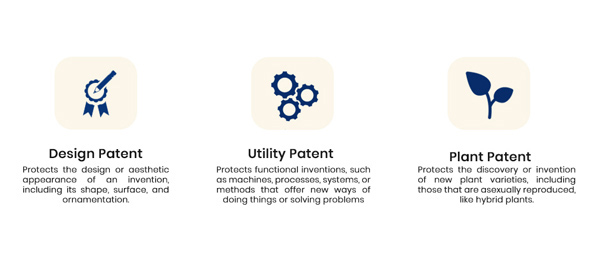Free Patent Search Online
Easily discover, compare, and file patents using our comprehensive global patent search engine.
Types of Patents

3-Step Process

The Legal Framework for Patents in India
In India, the patent system is governed by two primary legal instruments:
1. Patents Act, 1970
● This Act establishes the core principles for granting patents in India and defines key aspects such as:
● Who can apply for a patent (e.g., inventor, assignee, legal representative)
● What can be patented (new, inventive products, processes, or articles)
● Patentability requirements (novelty, inventive step, industrial applicability)
● Application process (filing, examination, and grant procedure)
● Patent duration (typically 20 years)
● Post-grant procedures (maintenance, dispute resolution, enforcement)
2. Patents Rules, 2003
● These Rules provide detailed operational guidelines for the implementation of the Patents Act, covering:
● Application filing (forms, content requirements)
● Documentation (specifications, drawings, claims)
● Examination process (responding to objections, hearings)
● Fee structure for various stages of the application process
The Patents Act sets the legal foundation for granting patents in India, while the Patents Rules provide detailed procedural guidelines for the application, examination, and maintenance of patents.
Importance of Patent Rules
• The Patent Act establishes the core legal principles for patents.
• The Patent Rules provide the operational framework, detailing how the Act is implemented.
• They act as a user manual for patent applicants, offering clear guidelines on the application process.
• The Rules ensure consistency, transparency, and efficiency in patent proceedings.
• They are crucial for the administration of patents, helping streamline the process from application to grant.
Latest Patents in India
ID: 202448033223
ID: 202448032929
ID: 202448032868
ID: 202448032819
ID: 202448032789
ID: 202448032707
ID: 202448032444
ID: 202448032232
What Is a Patent Search
A patent search is the process of investigating existing patents to determine whether a particular invention is new and non-obvious. It helps inventors ensure their idea has not been patented already, which is a crucial step before filing a patent application.
A patent grants the inventor or business exclusive rights to their invention, preventing others from producing, importing, or selling it without their permission. To safeguard their innovative ideas, inventors typically file for a patent.
However, filing a patent in India can be a legally complex and time-consuming process. Fortunately, GTS offers a hassle-free solution for patent registration, enabling inventors to complete the process quickly and efficiently.

Why Conduct a Patent Search
1. Verify Novelty: Before filing a patent, you must ensure your invention is new and hasn’t already been patented. This is the first hurdle in the patenting process.
2. Save Time and Money: By identifying existing patents early on, inventors can avoid unnecessary filing fees or costs associated with patent prosecution if their idea is already patented.
3. Gain Competitive Insights: A thorough patent search can reveal important details about similar products or technologies, allowing businesses to innovate further or refine their idea.
4. Increase Chances of Approval: By performing a comprehensive search, inventors are more likely to file a strong, successful patent application.
Benefits of Filing a Patent
● Exclusive Rights: Once granted, a patent gives you exclusive rights to your invention, meaning only you (or those you license it to) can produce, sell, or import the product.
● Increased Business Value: A patent is a valuable asset, and holding a patent can enhance your company’s marketability and attract investment.
● Monetization Opportunities: You can license or sell your patent to other businesses, creating a new revenue stream.
● Protection Against Infringement: A patent protects your invention from being copied or used without permission by others, which helps in safeguarding your intellectual property.
Why Partner with GTS

Our team of legal and business experts is committed to handling your registration and filing requirements with precision

Our intuitive tools make it easy for you to navigate through each step, ensuring a fast and hassle-free experience.

We offer customized services that are specifically designed to meet the unique needs of your business structure and goals.

With over 500,000 businesses served, GTS is recognized as a reliable partner for all your business registration and legal service needs.
FAQ
A patent is a legal right that gives the inventor of a new or useful invention the exclusive right to exploit it commercially. The patent owner can decide how others can use the invention, or if they can use it at all. In exchange, the owner must make technical details of the invention public in a published patent document.
A patent search helps you avoid wasting time and money by checking if your invention already exists or is similar to existing patents. It ensures your invention doesn’t infringe on others’ patents and helps assess if it’s eligible for a new patent, protecting your intellectual property.
To conduct a patent search, you need a detailed description of your invention, including its features and functions, relevant keywords, drawings or diagrams, and information about similar products or technologies. This helps ensure a more accurate and effective search.
If you find a patent similar to your invention, it could impact your ability to get a patent or lead to potential infringement issues. Consulting a patent attorney is recommended to understand the legal implications and explore your options.
To improve the accuracy of your patent search, use varied keywords, explore relevant patent classifications, apply filters, and review both granted patents and pending applications. Additionally, search across multiple databases for a thorough analysis.
The title of the invention described in the ‘One-Wheeled Vehicle’ patent is “One-Wheeled Vehicle.”
The ‘One-Wheeled Vehicle’ patent was filed with the United States Patent and Trademark Office (USPTO).
If you find a similar patent, compare its claims with your invention. Consult GTS IP experts to assess potential risks and explore your options, such as modifying your invention or seeking a license.
The time required for a patent search can vary depending on factors such as the search’s complexity, the information available, and the approach used. On average, the process can take from a few hours to several days.
